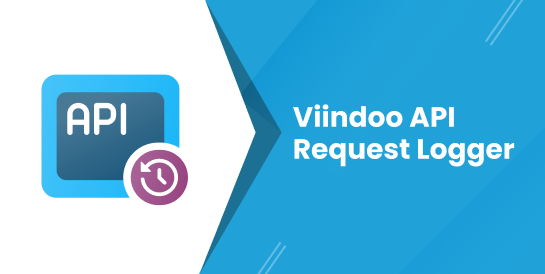Demo video: API Request Logger
### Viindoo API Request Logger
A comprehensive solution for managing and monitoring API requests in Odoo.
The Viindoo API Request Logger provides developers with a centralized system to log and analyze API interactions, ensuring debugging efficiency, compliance, and detailed insights into external service integrations.
#### Key Features:
- Automatically record all API requests and responses with parameters, results, and execution time.
- Track user activities and the originating model or record for each request.
- Maintain logs for debugging, performance analysis, and audit trails.
- Easy-to-integrate with any Odoo module using a mixin-based architecture.
#### Ideal For:
- Odoo developers who frequently work with external API integrations.
- Businesses requiring traceability of API requests for compliance and debugging.
- Teams managing complex multi-system interactions.
#### How It Works:
1. Integration: Add viin_api_request_logger as a dependency to your module.
2. Usage: Inherit the api.request.mixin in your models to enable automatic logging.
3. Analysis: Access the logged data from the interface for debugging or compliance audits.
Visit our [documentation](https://viindoo.com) for detailed implementation guides.
Editions Supported
- Community Edition
- Enterprise Edition
API Request Logger Documentation
Overview
The viin_api_request_logger module provides a framework for logging and monitoring API requests in Odoo. Designed for developers and administrators, it tracks all details of API interactions, including:
- User initiating the request
- Related model and record
- Request parameters, headers, and payload
- API response data and errors
- Request duration
Key Features
- Detailed Logging: Capture all request/response details, including errors.
- Error Monitoring: Automatically logs failed API requests for better debugging.
- Extensible Integration: Easily integrate with models using the provided mixins.
- User-Friendly API Log Viewer: Quickly access logs related to any model record.
- Customizable: Fully adaptable for specific business needs.
Installation
Install the module via the Odoo Apps interface or the command line:
odoo-bin -c <config_file> -i viin_api_request_logger
Configure user access rights to ensure secure access to logs.
Usage
Logging API Requests
To enable automatic logging for API requests, inherit the api.request.mixin in your model and use the make_request method. Here's an example:
class ExampleIntegration(models.AbstractModel):
_name = 'example.integration'
_inherit = 'api.request.mixin'
def example_api_call(self):
response = self.make_request(
method="GET",
url="https://api.example.com/data",
headers={"Authorization": "Bearer <token>"},
params={"key": "value"},
res_model="example.model",
res_id=1,
)
return response.json()
Viewing API Logs
To allow users to view related logs, inherit the api.log.viewer.mixin in your model. This mixin provides:
- `last_api_request_log_id`: A computed field showing the most recent API log.
- `action_view_api_logs`: An action to display all related logs.
Example:
class ExampleModel(models.Model):
_name = 'example.model'
_inherit = 'api.log.viewer.mixin'
Logs can also be accessed via the "API Logs" menu in the Odoo interface.
Customizing the Logger
Override _prepare_log_values to include custom fields in the log:
def _prepare_log_values(self, method, url, headers, data, response, duration, res_model=None, res_id=None, error_message=None):
values = super()._prepare_log_values(method, url, headers, data, response, duration, res_model, res_id, error_message)
values.update({"custom_field": "Custom Value"})
return values
Configuration
The module works out-of-the-box but can be extended for advanced configurations.
Advanced Scenarios
- Custom Headers: Use the headers parameter in make_request to add headers such as authentication tokens.
- API Monitoring: Leverage the response_headers and response_data fields to debug or analyze responses.
- Integration with External Tools: Export logs for use with monitoring tools like ELK Stack or Datadog.
This software and associated files (the "Software") may only be
used
(executed, modified, executed after modifications) if you have
purchased a
valid license from the authors, typically via Odoo Apps,
or if you
have
received a written agreement from the authors of the
Software (see the
COPYRIGHT file).
You may develop Odoo modules that use the Software as a library
(typically
by depending on it, importing it and using its
resources), but
without
copying any source code or material from the
Software. You may distribute
those modules under the license of your
choice, provided that this
license
is compatible with the terms of
the Odoo Proprietary License (For
example:
LGPL, MIT, or proprietary
licenses similar to this one).
It is forbidden to publish, distribute, sublicense, or sell
copies of the
Software or modified copies of the Software.
The above copyright notice and this permission notice must be
included in
all copies or substantial portions of the Software.
THE SOFTWARE IS PROVIDED "AS IS", WITHOUT WARRANTY OF ANY KIND,
EXPRESS OR
IMPLIED, INCLUDING BUT NOT LIMITED TO THE WARRANTIES OF
MERCHANTABILITY,
FITNESS FOR A PARTICULAR PURPOSE AND
NONINFRINGEMENT. IN NO EVENT
SHALL THE
AUTHORS OR COPYRIGHT HOLDERS
BE LIABLE FOR ANY CLAIM, DAMAGES OR OTHER
LIABILITY, WHETHER IN AN
ACTION OF CONTRACT, TORT OR OTHERWISE,
ARISING
FROM, OUT OF OR IN
CONNECTION WITH THE SOFTWARE OR THE USE OR OTHER
DEALINGS IN THE
SOFTWARE.
